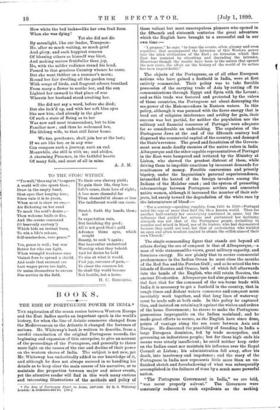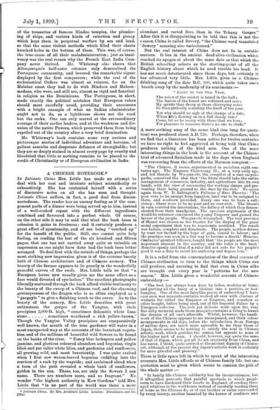BOOKS.
THE RISE OF PORTUGUESE POWER IN INDIA.* THE exploration of the ocean routes between Western Europe and the East Indies marks an important epoch in the world's history, for when the line of Asiatic commerce changed from the Mediterranean to the Atlantic it changed the fortunes of nations. Mr. Whiteway's book is written to describe, from a careful examination of the original Portuguese records, the beginning and expansion of this enterprise, to give an account of the proceedings of the Portuguese, and generally to throw more light on the causes of the rise and decline of their power on the western shores of India. The subject is not new, yet Mr. Whiteway has undoubtedly added to our knowledge of it, and although he does not always succeed in so handling his details as to keep clear the main course of his narrative, or to maintain due proportion between major and minor events, yet the attentive reader will find in this work many curious and interesting illustrations of the methods and policy of • The Mee of Portuguese Power in 2197,1550. By B. 8. WhitewaY London A. Constable and Co. [15e..]
those valiant but most unscrupulous pioneers who opened in the fifteenth and sixteenth centuries the great adventure which the English have brought to a successful end in our own time :—
"I propose," he says, "to trace the events, often gloomy and even repulsive, that accompanied the intrusion of this Western power into the alien civilisation of the East ; an intrusion which that East has resented by absorbing and degrading the intruder. Disastrous though the results have been to the nation that opened the new route, the effect on the history of the world of its action has been imperishable."
The objects of the Portuguese, as of all other European nations who have gained a foothold in India, were at first entirely commercial. Their policy was to take forcible possession of the carrying trade of Asia by cutting off its communications through Egypt and Syria with the Levant; and as this trade was fostered and protected by the riders of those countries, the Portuguese set about destroying the sea-power of the Ma.hommedans in Eastern waters. In this policy, although it was pursued with the fierce energy that is bred out of religious intolerance and avidity for gain, their success was but partial, for neither the population nor the military and financial resources of Portugal were adequate for so considerable an undertaking. The expulsion of the Portuguese Jews at the end of the fifteenth century had dispersed the commercial capital of the country, and damaged the State's revenue. The greed and fanaticism of the Govern- ment soon made deadly enemies of the native rulers in India Albuquerque and the other capable representatives of Portugal in the East were hampered and irritated by the Ministry at Lisbon, who showed the greatest distrust of them, while driving them to impolitic exactions by incessant demands for remittances of money. Forcible conversions and priestly bigotry, under the Inquisition's paternal superintendence, intensified the hatred of the foreign invaders among the Indians of the Malabar coast ; and the system of promoting intermarriage between Portuguese settlers and converted native women, although it increased the number of their sub- jects, led surely toward the degradation of the white race by the intermixture of blood :—
" For a century—speaking roughly, from 1450 to 1550—Portugal ruled the seas of more than half the then known world. Then for another half-century her sovereignty continued in name, but the influence that guided her actions and galvanised her declining strength was not that of the Portuguese people dwindling in number and mixed in blood, nor of its leaders, who had degenerated because they could not lead, but that of ecclesiastics who wielded an open and often insolent control to obtain the selfish aims of their own Church."
The single commanding figure that stands out beyond all others during the era of conquest is that of Albuquerque,—a man of wide statesmanlike views, great military capacity, and ferocious energy. He saw plainly that to secure commercial predominance in the Indian Ocean he must close the mouths of the Red Sea and the Persian Gulf ; and so he seized the two islands of Socotra and Ormuz, both of which fell afterwards into the hands of the English, who still retain Socotra, the ancient Dioskorides. Albuquerque had also grasped the essen- tial fact that for the command of the sea-borne trade with India it is necessary to get a foothold in the country, that in rough times and distant waters commerce and conquest muat inevitably work together, and that long lines of waterway must be made safe at both ends. In this policy he captured Goa, and insisted on retaining it against the wishes and orders of the home Government; he strove to make the Portuguese possessions impregnable on the Indian mainland; and he made great efforts to secure, as the English have since done, points of vantage along the sea route between Asia and Europe. He discerned the possibility of founding in India a large European dominion, fed by trade monopolies, and governing an industrious people; but for these high ends his means were utterly insufficient; he could neither keep order on the Indian coast nor maintain his influence over the Royal Council at Lisbon; his administration fell away, after his death, into insolvency and impotence; and the story of the Portuguese in India now represents little more than an un- finished sketch and foreshadowing of what was subsequently accomplished in the fullness of time by a much more powerful nation.
"The Portuguese Government in India," we are told, "was never properly solvent." The Governors were constantly reduced to such expedients as the sacking of the treasuries of famous Hindoo temples, the plunder- ing of ships, and various kinds of extortion and piracy which kept them in perpetual warfare by sea and land, so that the same violent methods which filled their chests knocked holes in the bottom of them. This was, of course, the true cause of all their maladministration; just as insol- vency was the real reason why the French East India Com- pany never thrived. Mr. Whiteway also shows that Albuquerque's half-caste colonies only demoralised the Portuguese community, and lowered the remarkable vigour displayed by the first conquerers ; while the zeal of the ecclesiastical Orders was almost as ruinous, for on the Malabar coast they had to do with Hindoos and Mahom - medans, who were, and still are, almost as rigid and fanatical in religion as the Dominicans. The Portuguese, in short, made exactly the political mistakes that European rulers should most carefully avoid, providing their successors with a bright example of what an Indian administrator ought not to do, as a lighthouse shows not the road but the rocks. One can only marvel at the extraordinary courage of their earlier leaders, and at the weakness and dis- union of the native Powers, which preserved them from being expelled out of the country after a very brief domination.
Mr. Whiteway's book contains some very curious and picturesque stories of individual adventure and heroism, of gallant assaults and desperate defences of strongholds; but they are so deeply stained in almost every page by cruelty and bloodshed that little or nothing remains to be placed to the credit of Christianity or of European civilisation in India.
















































 Previous page
Previous page